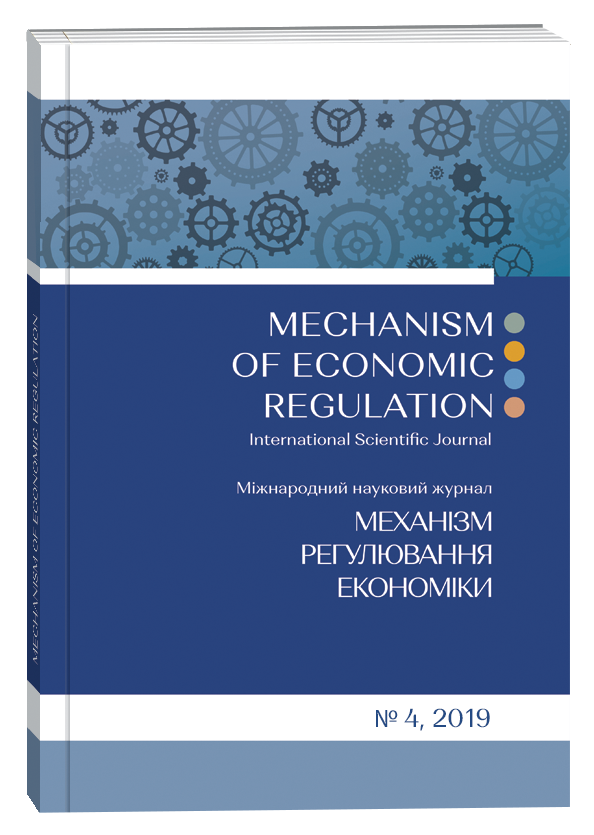ЕКОНОМІЧНІ ТА СОЦІАЛЬНІ ВИКЛИКИ ПРОРИВНИХ ТЕХНОЛОГІЙ В УМОВАХ ІНДУСТРІЇ 4.0 ТА 5.0: ДОСВІД ЄС
Анотація
У статті проаналізовано економічні та соціальні виклики проривних технологій в умовах Індустрії 4.0 та Індустрії 5.0. У статті розглянуто напрямки досліджень у галузі Індустрій 4.0 та 5.0 та їх вплив на сталий розвиток. У дослідженні пояснюються напрямки розвитку проривних технологій в контексті сталого розвитку. Розглядається процес розвитку проривних технологій, таких як телефон, який замінив телеграф, пароплави, які прийшли на зміну вітрильним суднам, напівпровідники, що прийшли на зміну вакуумному устаткуванню, електронна пошта, яка змінила традиційну і багато іншого. У статті аналізуються основні проривні технології створення Інтернету речей. У статті показані потенційні економічні характеристики проривних технології у найближчі п’ять років. Досліджується досвід ЄС щодо реалізації потенціалу проривних технологій в умовах Індустрії 4.0 та 5.0. У статті висвітлюються тенденції, які позитивно впливають на зростання та розвиток бізнесу до 2022 року відповідно до звіту про майбутнє ЄС. Це, зокрема, активне застосування новітніх технологій та використання великих даних; поширення мобільного Інтернету; прогрес у галузі штучного інтелекту та хмарних технологій; зростання національних економік; поширення освіти; досягнення у сфері енергозабезпечення та технологій альтернативної енергетики. Дослідження демонструє, як зміняться проривні технології до 2025 року та які позитиві та негативні зміни можуть відбутися у бізнес спільноті. У статті розглянуто питання потенційного економічного та соціального впливу проривних технологій у найближчому майбутньому. Подано характеристику можливих наслідків впровадження ключових проривних технологій сучасності: наприклад, надмірний психологічний вплив; ризик зменшення творчого потенціалу; посилення інформаційної залежності; зниження конфіденційності особистого життя; ризики неконтрольованого зниження інформаційної безпеки (наприклад, через хакерів); підвищення інформаційної вразливості цивілізації; ризик втрати людського контролю над кіберсистемами, тощо.
Посилання
Voytko, S. V. (2019). Realizatsiya osvitnʹoho ta promyslovoho potentsialiv Ukrayiny u hlobalʹnykh umovakh Industriyi 4.0 [Realization of educational and industrial potential of Ukraine in the global conditions of Industry 4.0] Ekonomichnyy visnyk NTUU «KPI».
Industriya 4.0. Tekhnolohiyi ta innovatsiyi. (2018) [Industry 4.0. Technology and innovation]. Retrieved from https://www.it.ua/knowledge-base/technology-innovation/industry-4
Christensen, C. M. (2016). The Innovators Dilemma. When New Technologies Cause Great Firms to Fail. Harvard: Harvard Business Review Press. Retrieved from https://www.hbs.edu/faculty/Pages/item.aspx?num=46
Deep Shift Technology Tipping Points and Societal Impact. Survey Report. (2015). World Economic Forum. Retrieved from: http://www3.weforum.org/docs/WEF_GAC15_Technological_Tipping_Points_report_2015.pdf
Digital Single Market Policy. Digitising European Industry. (2018). Retrieved from https://ec.europa.eu/digital-single-market/en/policies/digitising-european-industry
Digital Single Market Policy. The Internet of Things. (2019). Retrieved from https://ec.europa.eu/digital-single-market/en/internet-of-things
Digitalisation of industry – Workers and social issues at the centre! 22 March 2017. Retrieved from https://ec.europa.eu/digital-single-market/en/blog/digitalisation-industry-workers-and-social-issues- centre
Disruptive technologies: Advances that will transform life, business, and the global economy. (2013). Retrieved from https://www.mckinsey.com/business-functions/digital-mckinsey/our- insights/disruptive-technologies
Manyika, J., Chui, M., Bughin, J., Dobbs, R., Bisson, P., & Marrs, A. (2013). Disruptive technologies: Advances that will transform life, business, and the global economy. McKinsey Global Institute. McKinsey & Company. Retrieved from https://www.mckinsey.com/business- functions/mckinseydigital/our-insights/disruptivetechnologies
Marr, B. (2019). Is Artificial Intelligence Dangerous? 6 AI Risks Everyone Should Know About. Retrieved from https://www.forbes.com/sites/bernardmarr/2018/11/19/is-artificial-intelligence- dangerous-6-ai-risks-everyone-should-know-about/#1963fc922404
Melnyk, L., Dehtyarova I., Kubatko, O. & Skrypka, Y. (2018). EU Economic and Legislative Policies for Industries 3.0 and 4.0 Promotion. Mekhanizm rehulyuvannya ekonomiky [Mechanism of Economic Regulation], 4. https://doi.org/10.21272/mer.2018.82.03
Nahavandi, S. (2019). Industry 5.0-A Human-Centric Solution. August. Sustainability 11(16):4371. Retrieved from https://doi.org/10.3390/su11164371
Rada, M. (2018). Industry 5.0 definition. Retrieved from: https://medium.com/@michael.rada/industry-5-0-definition-6a2f9922dc48 .
Rossi, B. (2018). What will Industry 5.0 mean for manufacturing? / Raconteuk. Retrieved from https://www.raconteur.net/technology/manufacturing-gets-personal-industry-5-0
Samofalov, P. (2015). Modernizatsiya proizvodstva v stile Industriya 5.0. [Modernization of production in the style of Industry 5.0.]. Retrieved from http://www.plm.pw/2015/12/Industry-5- 0.html
Schwab, K. (2017). The Fourth Industrial Revolution. Davos: World Economic Forum.
Schwab, K., & Davis, N. (2018). Shaping the Fourth Industrial Revolution. Davos: World Economic Forum.
Shanhong, L. Global IoT market size 2017-2025. Retrieved from https://www.statista.com/statistics/976313/global-iot-market-size/
The Future of Jobs Report 2018. Centre for the New Economy and Society. (2018). World Economic Forum.
Vollmer, M. (2018). What is Industry 5.0? Linkedin. Retrieved from https://www.linkedin.com/pulse/what-industry-50-dr-marcell-vollmer


